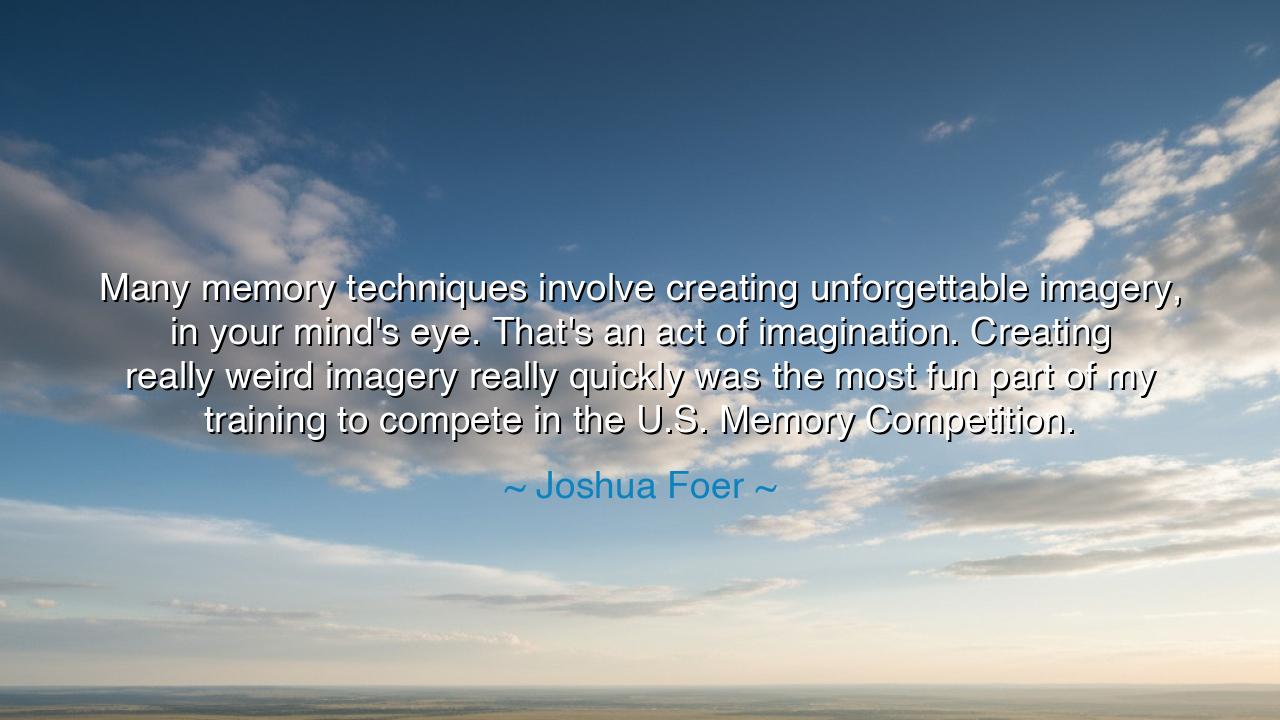
Many memory techniques involve creating unforgettable imagery, in
Many memory techniques involve creating unforgettable imagery, in your mind's eye. That's an act of imagination. Creating really weird imagery really quickly was the most fun part of my training to compete in the U.S. Memory Competition.






“Many memory techniques involve creating unforgettable imagery, in your mind's eye. That's an act of imagination. Creating really weird imagery really quickly was the most fun part of my training to compete in the U.S. Memory Competition.” Thus spoke Joshua Foer, a modern sage of the mind, whose journey through the art of memory uncovered one of humanity’s oldest truths — that imagination is the mother of remembrance. His words, though born from the contests of intellect, carry the weight of ancient wisdom: that to truly remember, one must first create. For memory is not a passive act of storage, but an act of living art — the weaving of images so vivid, so strange, that the mind itself cannot bear to forget them.
The ancients knew this long before our age of machines and screens. In the temples of Greece and Rome, the masters of rhetoric — the orators, philosophers, and poets — practiced what they called the ars memoriae, the art of memory. They walked through imagined palaces within their minds, placing symbols, images, and stories in each room to preserve their knowledge. Cicero himself wrote of it, and Simonides of Ceos, legend says, discovered it after tragedy struck a banquet hall. When the roof collapsed, he alone could recall the fallen — for in his imagination, he had placed each guest in their seat, and thus, through mental imagery, he remembered what stone and ruin could not.
Foer, in his modern pilgrimage through memory, echoes that same lineage of wisdom. He learned that to remember, one must not rely upon dull repetition or lifeless words, but upon the strange and powerful force of imagination. He filled his mind’s eye with wild, fantastic scenes — absurd, colorful, unforgettable — for the mind clings to the remarkable while it forgets the mundane. It was through weird imagery, as he says, that he unlocked the pathways of recollection. The act of imagination was not simply technique; it was joy — the very spark that animates the human mind to greatness.
To create vivid imagery, one must awaken the inner artist within. The mind becomes both canvas and brush, both stage and actor. Foer’s “weird imagery” — elephants balancing on violins, lightning made of gold, words turned into fire and rain — is no folly. It is the ancient alchemy of transformation: turning the invisible into visible, the fleeting into eternal. Imagination, when used thus, becomes a sacred instrument — the tool through which knowledge takes form and becomes living memory. It is not logic that anchors learning, but vision; not order, but wonder.
Think of Leonardo da Vinci, that eternal student of nature, who never merely studied what he saw but imagined what he could not. His notebooks overflowed with creatures that blended man, bird, and machine. He did not learn through memorization but through visualization, creating in his mind what his hands had yet to build. His genius was not in what he recalled, but in how he imagined — and that imagination, like Foer’s, gave birth to knowledge that transcended mere facts.
Thus, in Foer’s reflection, we glimpse a great truth about the mind: that imagination is not the opposite of reason, but its companion. The dull mind tries to memorize; the awakened mind creates. The act of memory becomes an act of artistry, and in that artistry lies joy. The wise do not fear the strange or the absurd — they harness it. For what the mind deems “weird,” the heart remembers forever. In that weirdness lies vitality, and in vitality, truth.
The lesson, then, is simple yet eternal: train your imagination. Do not be afraid to think vividly, to dream boldly, to paint your thoughts in colors that defy convention. When you wish to remember — a name, a story, a lesson — clothe it in imagery so alive that it dances in your mind’s eye. Make learning a festival of the senses. Turn memory into play, and study into art. For the mind, like a temple, is filled with rooms — and only through imagination can you fill them with living light.
So let Joshua Foer’s words be a call to all seekers of knowledge: memory is not a cage of facts, but a garden of visions. To remember is to imagine — and to imagine is to create life within the mind. Use your imagination not only to recall the past, but to shape the future. For in the end, the greatest memories are not those we are given, but those we create — and the act of creating them is the most divine joy of all.






AAdministratorAdministrator
Welcome, honored guests. Please leave a comment, we will respond soon